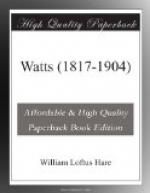“... When the object is to vitalise and develop faculties—the especial inheritance of the human race, but strangely dormant in our time among the largest section of the community—the claim becomes one that cannot be ignored. Looking at the subject from a point of view commanding a wide horizon, it seems to be nothing less than a social demand, rising into a religious duty, to make every endeavour in the direction of supplying all possible compensating consolation for the routine of daily work, become so mechanical and dreary. When home is without charm, and country without attaching bonds, the existence of a nation is rudely shaken; dull discontent leading to sullen discontent, may readily become active animosity. There will not be men interested in the maintenance of law and order, who feel that law and order bring them no perceptible formal advantage. In the race for wealth, it has been forgotten that wealth alone can offer neither dignity nor permanent safety; no dignity, if the man of the population is degraded by dull toil and disgraceful competition; no safety, if large numbers drag on a discontented existence, while the more active and intelligent leave our shores.
“Whether or not our material wealth is to be increased or diminished, it is certain that a more general well-being and contentment must be striven for. A happy nation will be a wealthy nation, wealthy in the best sense, in the assurance that its children can be depended upon in case of need, wealth above the fortune of war, and safety above the reach of fortune. The rush of interest in the direction of what are understood as worldly advantages, has trampled out the sense of pleasure in the beautiful, and the need of its presence as an element essential to the satisfaction of daily life, which must have been unconsciously felt in ages less absorbed in acquiring wealth for itself alone. In olden times our art congresses would have been as needless as congresses to impress on the general mind the advantages of money-making would be in these.” (Plain Handicraft, 1892.)
In G.F. Watts, however, we have an instance of a man who, although he sees and is attracted by abstract principles of ethics, does not perceive the manner of their final application; he is not really scientific. It might be thought that the painter of “Greed and Toil,” “The Sempstress,” “Mammon,” “The Dweller of the Innermost,” and “Love Triumphant,” would be able to indicate, in that sphere of social activity called “practical politics,” how these principles could find their expression and realisation. It is interesting, however, to know, and to have it authoritatively from his own pen, that Watts at least could not discern either the time or the application of these ethical principles to the affairs of the great world; for in 1901 there appeared from his hand a quasi-philosophical defence of the South African War, entitled “Our Race as Pioneers.” He said:




